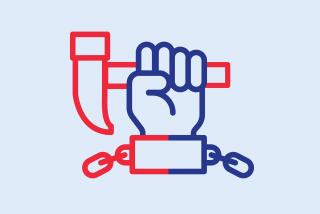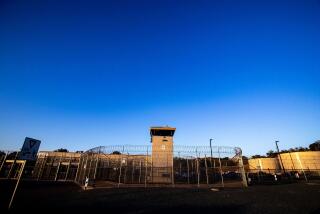Judge adds solitary confinement to prison crowding negotiations
This post has been updated.
SACRAMENTO — Federal judges considering California’s request for more time to reduce prison crowding have asked the state in turn to limit how long some mentally ill prisoners spend in solitary confinement.
U.S. District Judge Lawrence Karlton on Wednesday said he had accepted a state offer to limit the time severely mentally ill prisoners who have committed no rules violations can be held in isolation to 30 days. Hours later, he and the other two judges issued an order extending negotiations to Jan. 10, and pushing the state’s deadline to reduce crowding to April 18.
Karlton is holding hearings on the treatment of mentally ill inmates and also sits on the federal three-judge panel that ordered California to reduce prison overcrowding.
California has been ordered to remove 7,000 inmates from state prisons, reductions that judges say are needed to remedy unconstitutionally dangerous conditions, including inadequate medical and mental health care. In Wednesday’s order, the judges said they expect no further extension in the talks, “absent extraordinary circumstances,” but that does not preclude additional delays in the actual crowding deadline.
Gov. Jerry Brown first proposed to expand California’s contracts with private prison operators, mostly for beds in other states. The judges blocked expansion of out-of-state contracts and ordered the state to negotiate with prisoners’ lawyers over alternatives, including the early release of frail or elderly prisoners.
Transcripts of courtroom hearings show the talks took a twist after Thanksgiving, when Karlton said he was concerned about some 230 mentally ill prisoners currently housed in isolation cells, though they have committed no infraction. State prison officials say they are there for their own protection, or while awaiting space in a mental health unit.
Karlton said he told the other federal judges “that as far as I was concerned” the state’s request for an extension to reduce prison overcrowding should not be granted as long as those mentally ill inmates were being held in isolation units.
Lawyers for California made it clear that the state is eager to address the judge’s concerns about solitary confinement. Transcripts show that at one point last week, state officials were rushing documents to the judge for review. At another, they offered to produce Corrections Secretary Jeffrey Beard to speak with Karlton. The judge said he was told Brown’s office responded that it “understood the nature of the problem” and promised a quick remedy.
[Updated 4:26 p.m., Dec. 11: The new Jan. 10 cutoff for negotiations coincides with the deadline for Brown’s 2014 state spending plan. Senate Leader Darrell Steinberg (D-Sacramento) and a participant in the crowding negotiations, said that gives the court, as well as others, a chance to see how the governor proposes to fund prison programs. Steinberg seeks increased spending on mental health and substance abuse programs to reduce prison return rates.
Meanwhile, a team of court-appointed reviewers filed a report Wednesday declaring inadequate medical care at the state’s largest women’s prison, in Chowchilla. The report cites poor timeliness and quality of care at the prison, a lack of staff and medical beds. It attributes its findings to severe overcrowding: the prison was built to house 2,000 inmates but holds 3,500.]
ALSO:
Brown wins delay on prison crowding order
Judge orders prison plan for mentally ill on death row
Policy group links rise in car thefts to prison crowding policy
More to Read
Sign up for Essential California
The most important California stories and recommendations in your inbox every morning.
You may occasionally receive promotional content from the Los Angeles Times.











